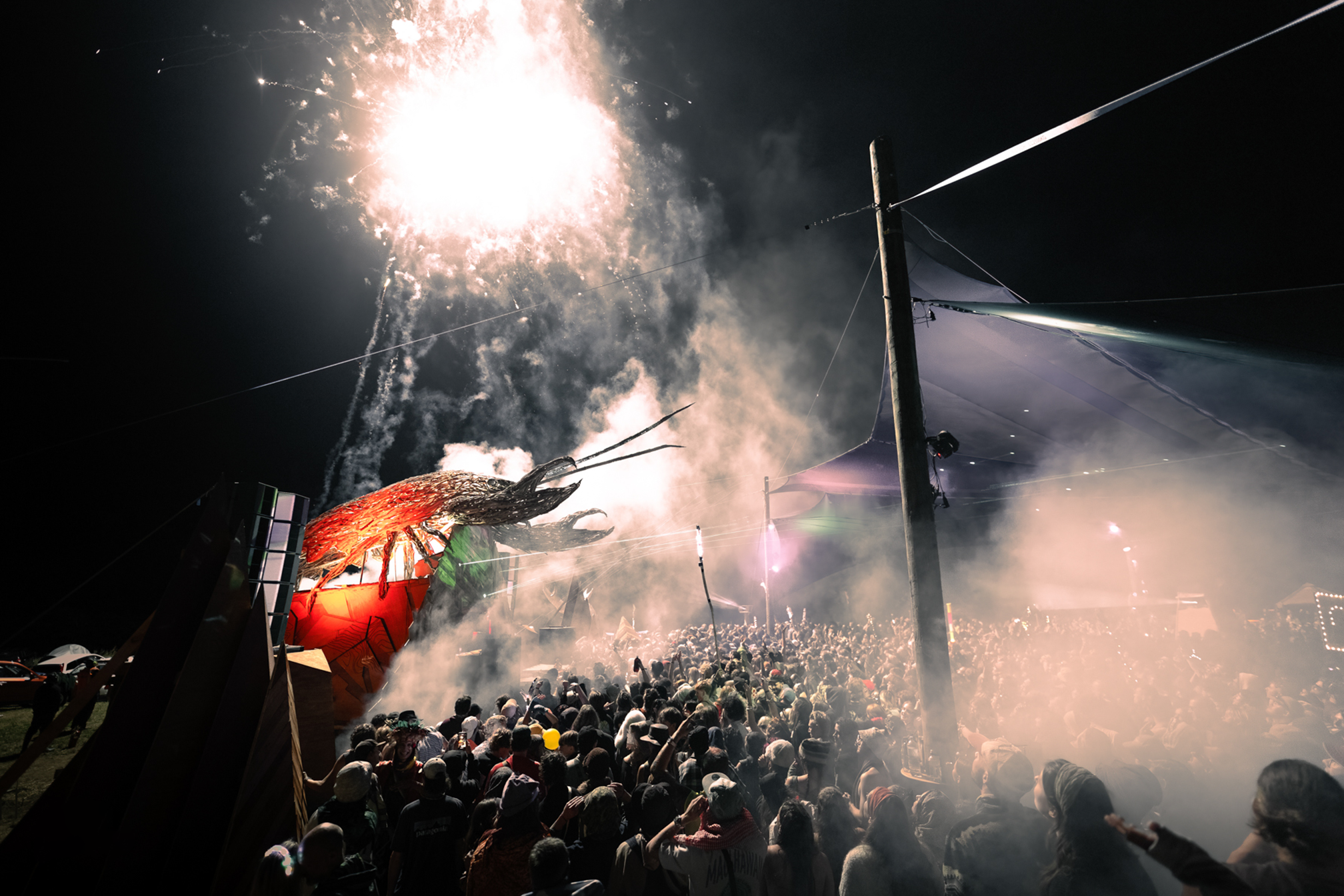 FEATURES
FEATURES
Culture & Kaupapa transmitting on a Twisted Frequency
As one of Aotearoa's favourite community festivals prepares to celebrate a decade, we spoke about what makes it what it is.
Music has more than ever before become a means of identifying ‘who’ your crowd is. While traditionally this may have been split into larger groups; punks, hippies, mods, ravers, etc, nowadays the split, even amongst dance music, has become incredibly niche.
Whether you’re into bass music, tech house, minimal, psytrance or baile funk, usually, around the world, there’s a place for you somewhere.
In Aotearoa/New Zealand however, in many instances there simply aren't enough people to sustain individual musical communities. The entire country’s population is matched by Naarm/Melbourne, spread out over a far larger distance.
While for other countries it’s music that joins people, in Aotearoa, it’s the inclination towards music itself that joins its scenes together.
Twisted Frequency is an event all too aware of this balance, the delicate approach it demands, and the unexpected entertainment that the shared space of many communities provides.
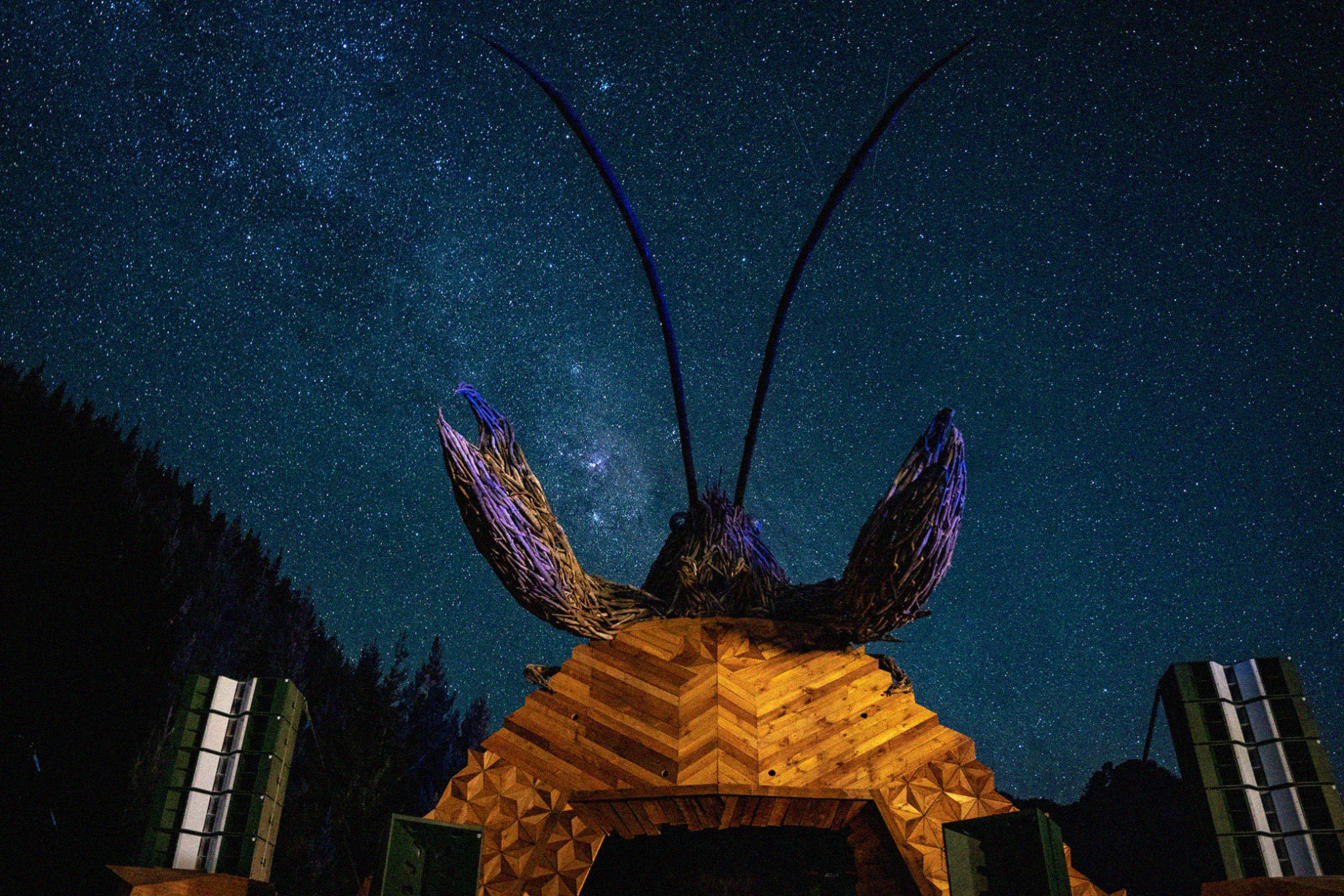
Taking place annually over New Year’s Eve, the festival is in the minds of many a coming together of Aotearoa’s underground music communities. While a name slowly becoming more familiar to me over the years, it was recent conversations with Eora/Sydney promoter DUNJ and NZ-based artist Keepsakes that solidified their well earned reputation in my mind.
This year celebrating a decade in action, Twisted Frequency sits at a precipice that often defines the legacy of many events. A well-kept secret in its own right, as the festival looks to plant itself even more deeply into Aotearoa’s yearly festival calendar, and to tempt travellers from across the seas, so too does it hope to stay true to its underground roots and sensibilities.
Twisted’s crew is, in the words of its Event Manager, David Tait, made up of “children of the wastes”. Young party enthusiasts growing up in the 90s & early 2000s, Twisted’s origins start like so many others, with 200 friends and a generator deep in some seemingly long forgotten clearing.
As far as origin stories go, Twisted’s wouldn’t appear as a huge shock to anyone that’s found themselves at a kick-on, after an exceedingly late party in Aotearoa or Australia. A broadly anti-establishment sentiment among a group of friends, made tangible in the form of a series of Guy Fawkes & Halloween parties, and a penchant for psychedelic music are the building blocks of what makes Twisted what it is today.
While the small-scale parties they’d become known for had satiated them up until this point, a little over a decade ago, there were two experiences that would forever change the outlook they had on their own events, and the scene as a whole. The first, and by far most light hearted was some of the core team’s experience of the Solar Eclipse Festival in Gimuy/Cairns, where they were blown away by the size, scale and intention of the gathering.
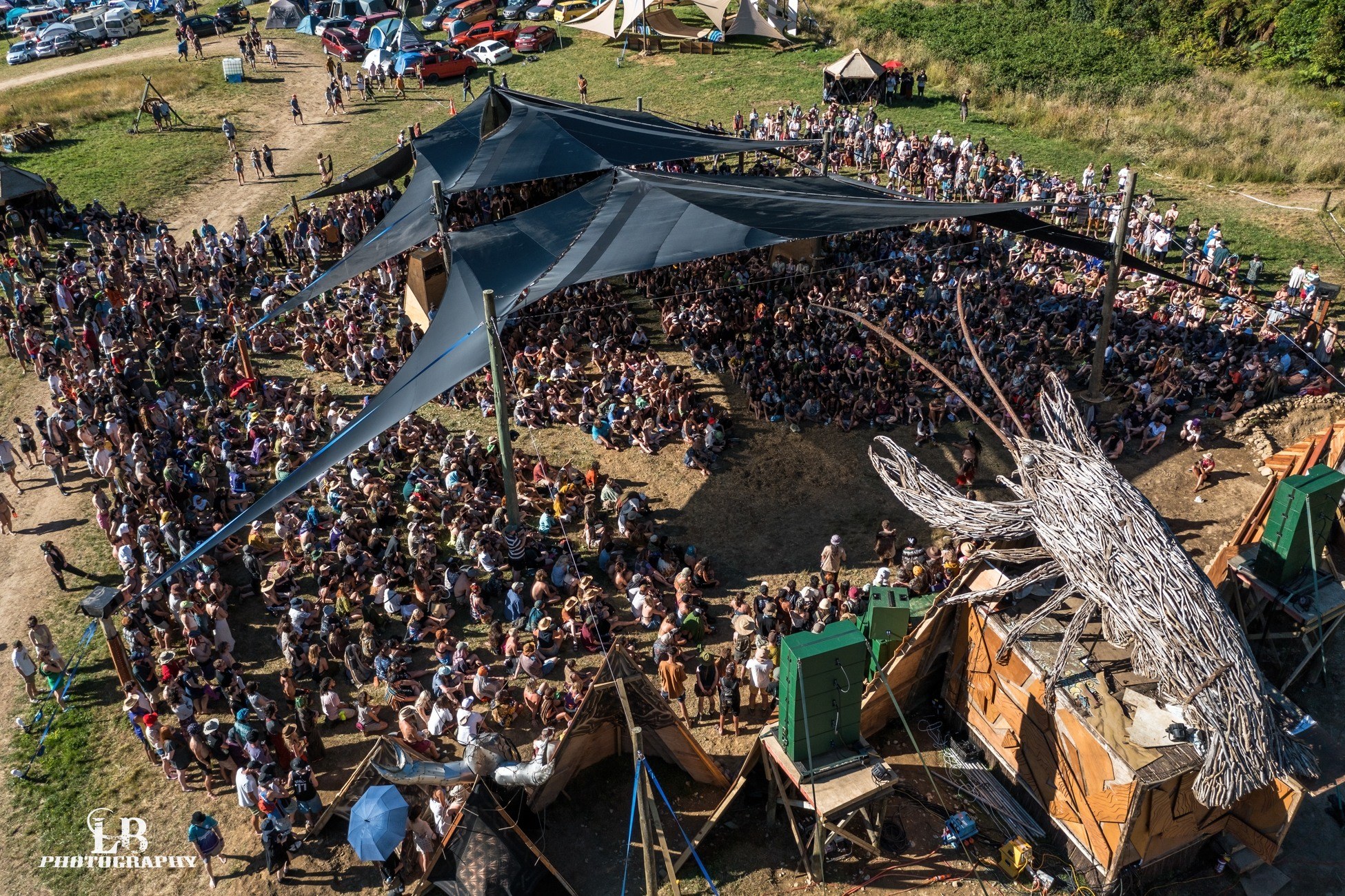
The second, inspiring in a whole different manner, was in Dee’s word “an awakening moment for the younger generation.” Some festivals that were occurring at the time taught Dee, his friends and many others that there was much work to be done to ensure the community's safety and that “all walks of life are being considered.”
The move from talking about moving from looser, more intimate events and doing something bigger, with more intent and with larger ambitions is entirely different to doing it however. Anyone can slack their jaw in the green room and talk someone’s ear off about how “their event will be different”, and what the Twisted team found initially despite the fantastic support of some of their scene’s legends, was that many older members of the community weren’t all too interested in teaching them how to level up.
“We were the really ratty, kind of weird bogan kids that were at the parties,” Dee explained.
Eventually however, Dee and the original Twisted team found their people, who were running different events, but understood the need and desire to help the younger generation to leave their own mark on Aotearoa.
& so they did.
This year Twisted is celebrating its 10th year, and suddenly the tables have turned. They are now the older, more seasoned organisers that they looked up to all those years ago, and they’re all too aware of it.
For Dee and his team, the focus has clearly always been about providing a space for Aotearoa’s underground communities to bring in the new year together. With this focus on community, with no one particular genre or scene dominating the lineup or make up of the crowd, there is an acknowledgement of the transience of the community itself.
“Twisted is significantly different to a lot of other big international festivals, because a huge part of the culture and the kaupapa of the event is the twisting of the frequencies,” Dee told me.
Aotearoa’s ‘doof’ history is rich and long. Golden Bay, where Twisted Frequency calls home, is in Dee’s words “a niche little part of the country where most of the dance culture history was born and is still really active.”
In Australia, the ‘multi-genre’ festival format has in many instances fallen short of the desires of many modern audiences. This shouldn’t imply that in Aotearoa the format is still thriving however, nor that Twisted doesn’t face the same kinds of financial pressure that plague similar events of its size.
For Dee, despite the awkward nature of needing to charge so much to be able to sustain the mission, the cost is clearly something that his audience is ready to pay. “Our event is now, at max, like 490 bucks. That’s a huge amount of money for a lot of people that love this festival, [but] they literally save their pennies and do the extra jobs to be here.”
By comparison, places like Australia, with a comparatively huge audience for dance and electronic music, are a whole world away. “Australia is like the Emerald City of Gold,” he joked. “The difference in available spending money, the difference in what you’re able to achieve with festivals because of the million plus festivalgoers that live there is crazy.”
A decade on, and with a hardcore set of fans signing up seemingly without question year on year, it’s clear that in many ways Twisted is a product not only by its organisers, but by the greater Aotearoa musical community as a whole. “Brand loyalty” is a term thrown around board rooms, but steady improvement and care is a no-brainer on how to prove to your people that you’re worth paying attention to.
“The biggest and most positive change over time is that we’ve really tightened up all aspects of the event,” Dee said proudly. “‘Full noise party’ is an aspect of the event that we really embrace, too.
Travelers will come here and a big international bass artist will be like, ‘holy fuck, you guys have a whole night of metal? What the hell.’ You know, they just love it. A big international techno artist will see an afternoon of cute indie bands, and they're just like, ‘Bloody beautiful.’”
This “full noise” approach means involving some of Aotearoa’s ‘loudest’ music communities to help make Twisted heard.
“We wouldn’t be here if we hadn’t given space to all of those different kinds of communities,” Dee explained.
“Twisted is yours. What are you going to do with it?”
The merging of so many different groups of people, each with their own individual tastes, in a world where it’s easier than ever to silo our hobbies or our taste, may seem terrifying. In practice though, Twisted appears to have hit a very rare spot that few festivals like it could ever hope to. Meredith and Inner Varnika come to mind as Australian-born events of a similar nature, where the programming is of arguably of far greater importance and scrutiny.
“If they've been coming since forever, they identify with Twisted.”
Dee explained that the image, sound and glow from these groups of people interacting was like an act on the lineup in itself. “You’ve got the bass heads, and all of the jazz school kids, and they’re in the same space mixing with like, the hippies, and then the people who are more used to being around button-up shirts and 4-4 music, and everyone’s just getting amongst it together.”
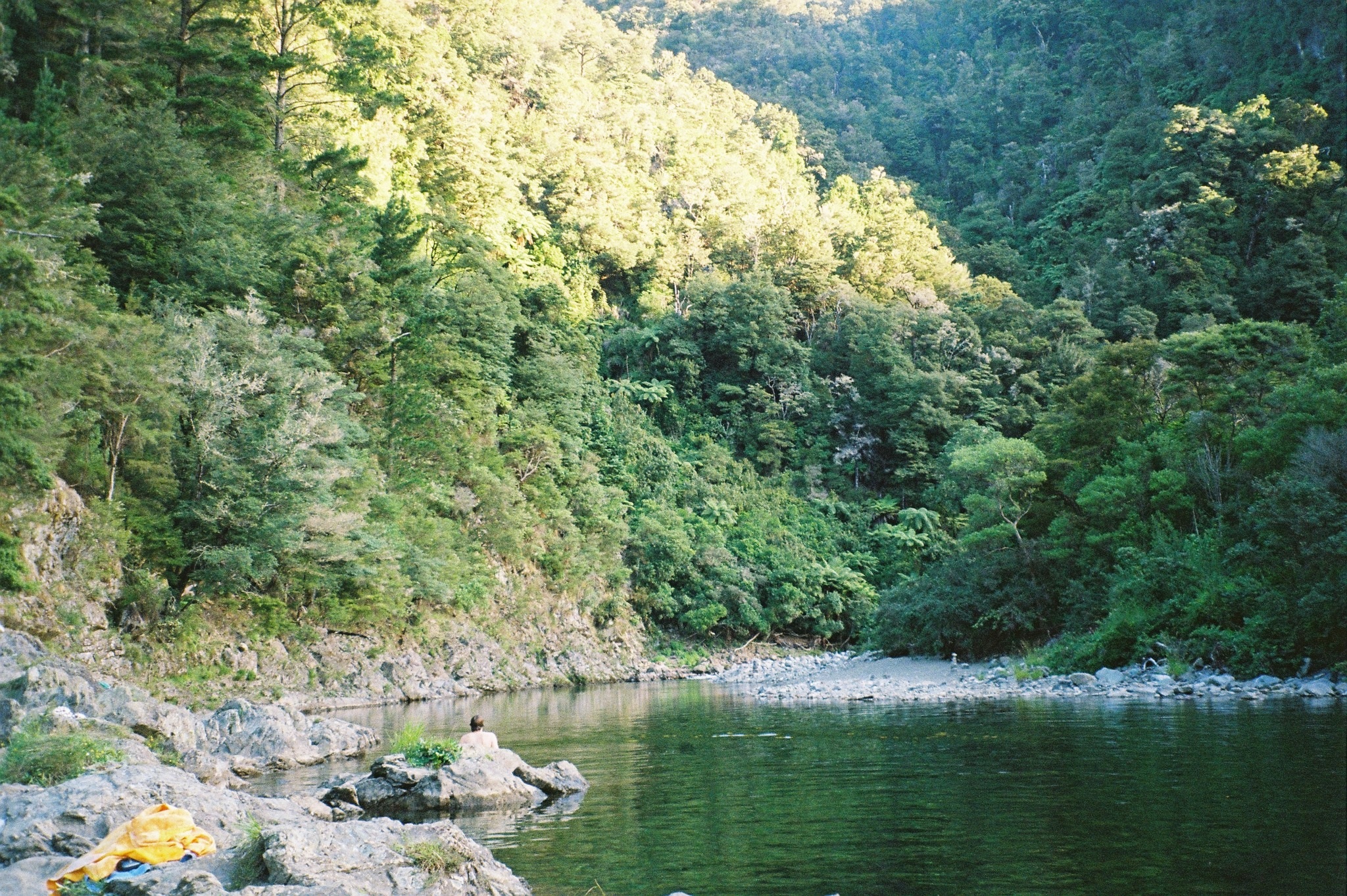
This melting pot of dancers, coming from musical movements with potentially different politics, backgrounds and socio-economic leanings, doesn’t only make for a good dance floor. For 8 years now, ‘workshops’ and talks have been a crucial part of the identity of Twisted.
These workshops, focused on body movement, discussions around race, gender, war, economics and loads more, have become an offering that many modern festivals hope to provide but few succeed in doing legitimately. What can often fall flat in the implementation of these kinds of spaces is intention. For Twisted, their policy is one of capitalising on the sheer variety of people willing to listen.
“I think that we're in a really unique position to actually affect change in the wider community through our festival,” Dee explained proudly. “So by inviting leaders in activism, science and more, people have a space to speak about important topics and share their knowledge on.”
Sharing ideas with political undertones shouldn’t be a surprise to anyone who’s set foot into a doof, let alone who knows the historical roots of dance music as a whole. Twisted’s approach to these conversations however is done with a legitimacy that comes from its understanding not only of the privilege it has, but the place upon which it gathers.
A number of its core members and broader team Whakapapa Māori. This connection to the place, to its needs, and particularly to a broader current political climate in Aotearoa, are all progressive elements clearly running through the DNA of what makes Twisted, Twisted.
To be clear, this somewhat utopian description of children under god singing ‘kumbaya’ isn’t as idealistic as it sounds, and for good reason. Twisted is, albeit built on these ideals and an unshakeable sense of community, at its core a good time first.
“We're owning the fact that we're a big party.”
-
Being such a good, well rounded time is most of the reason that anyone chooses to go to a festival, let alone travel. With such a small audience at their fingertips, Dee and the Twisted team are all too aware that growth means likely having to look overseas. Anyone in Aotearoa who needed convincing has likely already been convinced, and so now it’s up to them to become an international destination if they hope to grow any further.
The insane list of artists that Twisted has had appear in its 10 year innings is testament to just how easy a sell this should be. This year alone features the likes of Al Wootton, Madam X, Hypogeo, Eprom, Bayawaka, Azu Tiwaline and many, many more. Aotearoa doesn’t need a lot of help to sell itself. The country has long been one of the world’s most idyllic looking getaways, and Twisted’s home is no different, but it’s the sense of connection and community that Dee is clearly most proud to share.
“Internationals come here to be part of the Whānau, the family, and they just instantly immerse with us. It’s because of the experience that other performers had here,” he explained.
While one of the world’s largest DJs visiting your doof may be an exercise in money throwing to many, for Twisted, it’s the rigorous selection process of the people who play that lends itself to the growing reputation of the event internationally. It is, after all, a community celebration, and Dee put great emphasis on their desire to find someone who can really soak Twisted in, rather than seeing it as just another gig to play.
All of this may suggest an intense pressure, or burden of responsibility on Twisted’s organisers. Well, you’d be right.
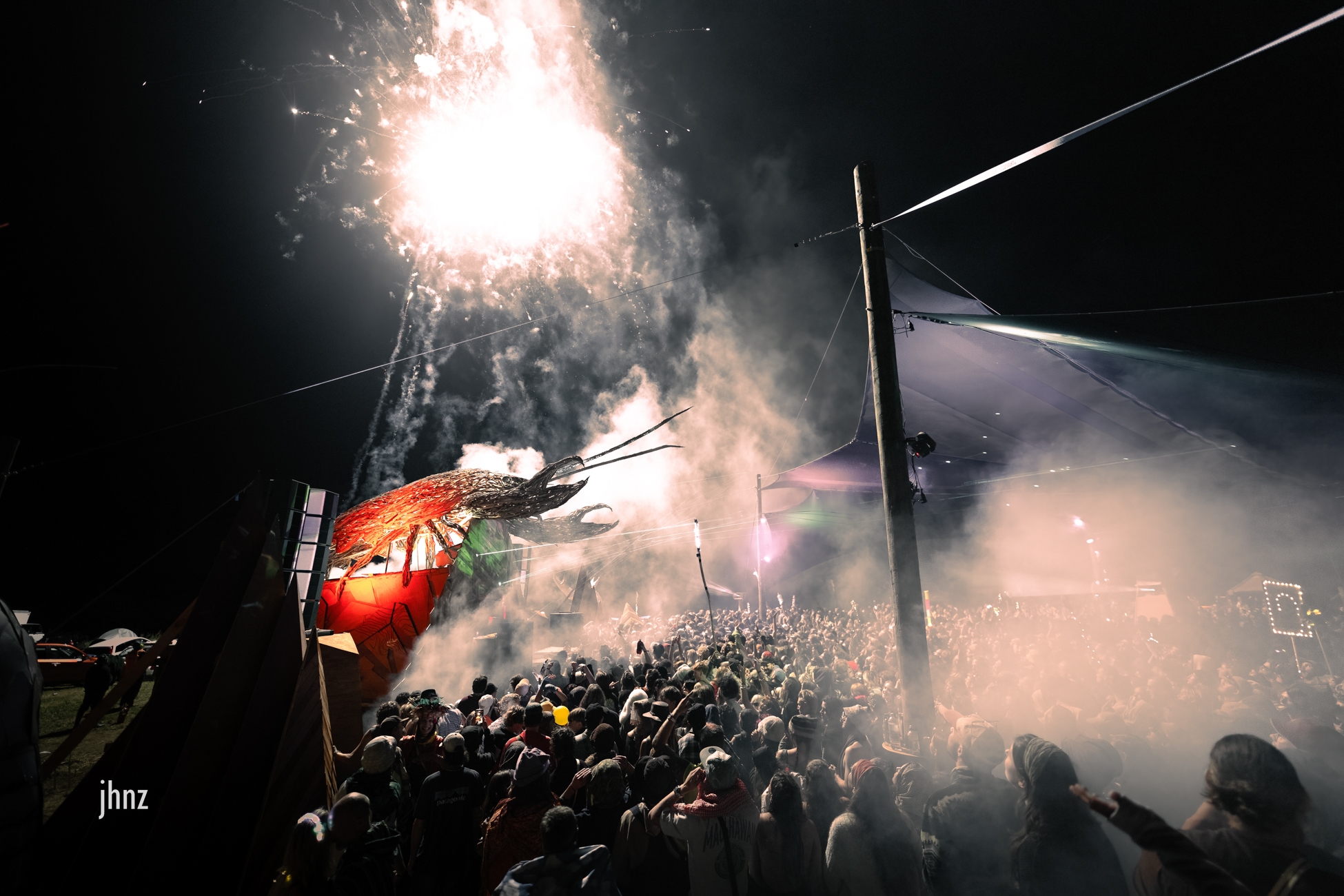
Dee is all too aware of what Twisted represents and means to the communities that call it their home.
“Once we reach this point, where we are now, where we represent the passion and the Mahi, the hard work of our community, there’s a huge responsibility that comes with that, and it’s pretty unavoidable, you know?”
Much like the crews who were there for them however, Dee and the Twisted team know that they exist amongst a new generation putting their spin on the culture and its sound. Whether the huge and growing queer club culture of Tāmaki Makaurau/Auckland, or the influence of big dance music institutions the world over, Twisted is changing with the times. “A much broader scope of 4-4 and bass music,” as Dee put it, is keeping in with the flexibility that Twisted has always been able to facilitate.
Twisted is there to be twisted. To be reformed, to fit into spaces that many other events wouldn’t. To nestle itself in a beautiful valley, to push and pull itself into all sorts of positions to create a makeshift home for the communities to which it owes so much. To shape itself around the lives of its organisers, “natural ebbs and flows of people's lifestyles, careers, babies, conflict. All of those things have kind of shaped who's running it now.”
Our conversation drew to a close and Dee, sitting at a desk in a makeshift site HQ, situated in what would appear to be an old green shed with an AIRNZ billboard as a roof, there was a flurry of activity as bump in crew came and went.
There was clearly a lot to do, not just right now, but for years to come.
-
An incredibly small number of tickets to Twisted Frequency remain, & are available via their website.
Jack Colquhoun is Mixmag ANZ's Managing Editor, find him on Instagram.


